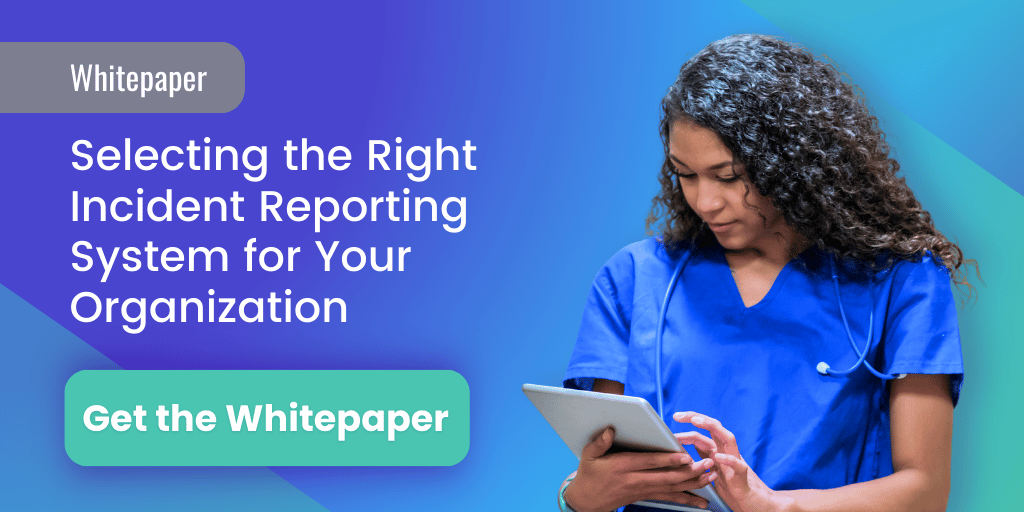3 min read
3 Features to Look for in Hospital Incident Reporting Software
Performance Health Partners
January 7, 2025
Finding the right hospital incident reporting software can not only greatly improve patient care, but also enhance safety in the work environment and decrease costs. It is extremely important to find the right solution that addresses your organization’s needs and can also be easily integrated into already functioning systems. Read on to learn the top three features to look for in a hospital incident reporting software.
When looking for an effective hospital incident reporting software, decision makers should consider the following factors:
Highly Customizable
A key feature to look for when searching for a hospital incident reporting software is the ability to customize the system. Each healthcare organization has its own unique care model, and subsequently its own needs, workflows, and priorities. A customizable incident management system allows them to adapt the system to their specific requirements. This ensures that the system is more effective in managing incidents and can be integrated smoothly into existing processes.
A customizable system also allows healthcare organizations to adjust and update their incident management protocols as needed. This can include changes in response procedures, updated reporting requirements, or the addition of new incident types. A customizable system ensures that the organization can adapt to changes in the healthcare environment quickly and effectively.
Furthermore, customizable incident reporting software allows organizations to collect data on incidents that are relevant to their specific context. This data can be used to identify trends, assess risks, and improve incident response over time. A customizable system ensures that data collection and analysis are aligned with the organization's priorities.
A software company that has experience working with various types of organizations is likely to be able to provide a solution that can be tweaked to fit every scenario. For example, Performance Health Partners serves organizations of all types and sizes, ranging from large hospital systems to community clinics and veterinary practices. Our platform is designed to be easily adaptable to the organization's needs.
It's also important to remember that a product’s customization should not have to end after implementation. Therefore, it’s important to find a hospital incident reporting software that can be continuously customized as your company continues to change and grow.
Easy to Use
An International Network of Agencies for Health Technology Assessment study showed that 30% of agency respondents claimed one of the biggest challenges was designing an effective and efficient process for engaging stakeholders.
Therefore, it’s necessary that an effective hospital incident reporting software make the reporting process run as smoothly and as easily as possible.
If an organization wants to increase reporting, it’s essential that the reporting platform be intuitive and user friendly. If staff do not see the process of submitting a report as burdensome, they are more likely to adopt and use a system. If the system is complex, cumbersome, or difficult to navigate, healthcare workers may be less likely to report incidents or follow incident response protocols, which can put patients at risk.
More reports collected lead to more accurate data about process gaps and other safety issues existing within the organization. As a result, time to resolution is improved and corrective actions can be taken more quickly to prevent future harm.
A hospital incident reporting software that is intuitive and user-friendly also ensures that healthcare workers can quickly and easily report incidents, follow incident response protocols, and access incident data. This improves the efficiency of incident management, allowing healthcare workers to spend less time on administrative tasks and more time providing patient care.
Excellent Customer Support
Of course, a software solution should be highly functionable and outcome focused. But it’s also important to choose a hospital incident reporting software from a company with proven customer service.
A hospital incident management system is a critical tool for identifying safety gaps, and any technical issues can have serious consequences. Good customer support ensures that technical issues are resolved quickly, minimizing downtime and reducing the risk of patient harm.
Additionally, excellent customer support can provide training resources and answer any questions that healthcare workers may have about the system. This ensures that healthcare workers can use the system effectively, reducing the risk of errors and improving patient safety. Similarly, they can provide expertise and guidance on data analysis, enabling healthcare organizations to make informed decisions.
If representatives are difficult to reach or communicate with while you’re researching your incident management system options, they’ll like not be a great team to partner with. Ask about a company’s relationship with their customers, including what support looks like during and beyond implementation. Should an issue arise once the software is up and running, a responsive support team can help ensure it’s resolved quickly and efficiently, avoiding further setbacks.
Keeping these three key features in mind when looking for a hospital incident reporting software can help decision makers select the best software for their organization to improve safety and outcomes, and decrease costs across the care continuum.
Ready to learn more?
Interested in learning more about how Performance Health Partners’ award-winning hospital incident reporting software can help your organization? Request a free demo with our team here.


